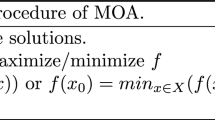Abstract
Decision-making under uncertainty is the unification of people’s subjective beliefs and the objective world. Quantum value operator is proposed to simulate people’s decision process. Quantum value operator guides people to choose corresponding actions based on their subjective beliefs through objective world. The quantum value operator can be constructed from basic quantum gates and logic operations as a quantum decision tree and the genetic programming is applied to optimize quantum decision trees. Quantum expected value is used as fitness function to evaluate the observed outcomes (gain or loss) in the process of decision-making under incomplete information. Basically based on Darwin’s natural selection, a computational model that incorporating insights from quantum theory is proposed to describe and explain people’s decision-making in the real world.




Similar content being viewed by others
Data Availability
The data that support the findings of this study are available on request.
References
Von Neumann, J. and Morgenstern, O. Theory of Games and Economic Behavior, Princeton, NJ: Princeton University Press (1944)
Savage, L.J.: The foundation of Statistics. Dover Publication Inc., New York (1954)
Binmore, K.: Rational Decisions. Princeton University Press, Princeton (2009)
Allais, M. and Hagen, O. Expected Utility Hypothesis and the Allais Paradox. Dordrecht: Reidel Publishing Company, pp. 434–698, (1979).
Ellsberg, D.: Risk, ambiguity and the savage axioms. Q. J. Economics 75, 643–669 (1961)
Kahneman, D., Tversky, A.: Prospect theory: an analysis of decision under risk. Econemetrica 47, 263–292 (1979)
Simon, H.A.: Reason in Human Affairs. Stanford University Press, Stanford (1983)
Ashtiani, M., Azgomi, M.A.: A survey of quantum-like approaches to decision making and cognition. Math. Soc. Sci. 75, 49–80 (2015)
Busemeyer, J.R. and Bruza, P.D. Quantum Models of Cognition and Decision, Cambridge University Press (2012).
Haven, E., Khrennikov, A., Quantum Social Science, Cambridge University Press (2013).
Aerts, D., Aerts, S.: Applications of quantum statistics in psychological studies of decision processes. Found. Sci. 1, 85–97 (1995)
Aerts, D.: Quantum structure in cognition. J. Math. Psychol. 53(5), 314–348 (2009)
Busemeyer, J., Franco, R., What is the evidence for quantum like interference effects in human judgments and decision behavior?. NeuroQuantology. 8, (2010).
Busemeyer, J.R., Franco, R., Pothos, E.M.: Quantum probability explanations for probability judgment errors. Psychol. Rev. 118, 193 (2010)
Wang, Z., Busemeyer, J.R.: A quantum question order model supported by empirical tests of an a priori and precise prediction. Top. Cogn. Sci. 5, 689–710 (2013)
Khrennikov, A., Basieva, I., Dzhafarov, E.N., and Busemeyer, J. R.: Quantum models for psychological measurements: An unsolved problem. PLOS ONE. 9, (2014).
Asano, M., Basieva, I., Khrennikov, A., Ohya, M., Tanaka, Y.: A quantum-like model of selection behavior. J. Math. Psych. 78, 2–12 (2017)
Basieva, I., Khrennikova, P., Pothos, E. M., Asano, M. and Khrennikov, A.., Quantum-like model of subjective expected utility. J. Math. Economics 78(C), 150--162 (2018).
Ozawa, M., Khrennikov, A.: Application of theory of quantum instruments to psychology: Combination of question order effect with response replicability effect. Entropy 2019, 22 (2019)
Ozawa, M. & Khrennikov, A. Modeling combination of question order effect, response replicability effect, and QQ-equality with quantum instruments. J. Math. Psychol. 100, (2021).
Yukalov, V.I., Sornette, D.: Physics of risk and uncertainty in quantum decision making. Eur. Phys. J. B 2009(71), 533–548 (2009)
Yukalov, V.I., Sornette, D.: Quantum probabilities as behavioral probabilities. Entropy 2017(19), 112 (2017)
Yukalov, V.I. Evolutionary Processes in Quantum Decision Theory, Entropy 2020. 22, 681, (2020).
Dirac, P.A.M. The Principles of Quantum Mechanics, Oxford University Press (1958).
Von Neumann, J.: Mathematical Foundations of Quantum Theory. Princeton University Press, Princeton (1932)
Nielsen, M.A. and Chuang, I.L. Quantum computation and quantum information, Cambridge University Press (2000).
Holland, J.: Adaptation in Natural and Artificial System. University of Michigan Press, Ann Arbor (1975)
Koza, J.R.: Genetic programming, on the programming of computers by means of natural selection. MIT Press, Cambridge (1992)
Acknowledgements
We would like to thank the anonymous referees of this journal, whose comments substantially improved the paper.
Author information
Authors and Affiliations
Contributions
All authors conducted the research and contributed to the development of the model. All authors reviewed the manuscript.
Corresponding author
Ethics declarations
Ethical Approval and Consent to participate
Consent for publication of this paper was obtained from all authors.
Consent for Publication
Consent was obtained from all authors.
Competing Interests
The authors declare no competing interests.
Additional information
Publisher's Note
Springer Nature remains neutral with regard to jurisdictional claims in published maps and institutional affiliations.
Rights and permissions
Springer Nature or its licensor (e.g. a society or other partner) holds exclusive rights to this article under a publishing agreement with the author(s) or other rightsholder(s); author self-archiving of the accepted manuscript version of this article is solely governed by the terms of such publishing agreement and applicable law.
About this article
Cite this article
Xin, L., Xin, H. Decision-making under uncertainty – a quantum value operator approach. Int J Theor Phys 62, 48 (2023). https://doi.org/10.1007/s10773-023-05308-w
Received:
Accepted:
Published:
DOI: https://doi.org/10.1007/s10773-023-05308-w




